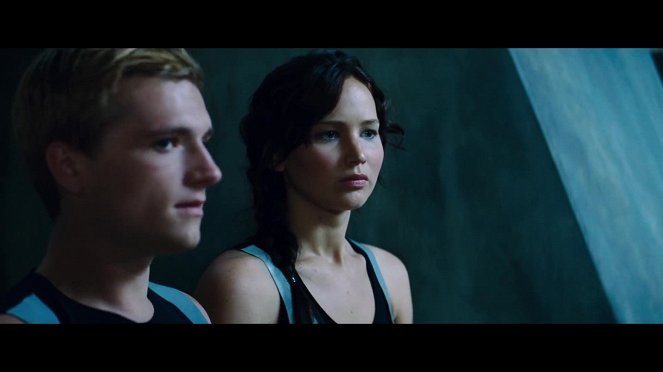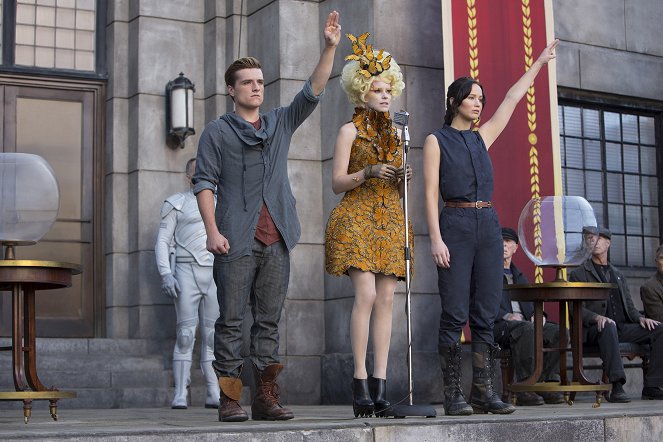Directed by:
Francis LawrenceCinematography:
Jo WillemsComposer:
James Newton HowardCast:
Jennifer Lawrence, Josh Hutcherson, Donald Sutherland, Woody Harrelson, Philip Seymour Hoffman, Jena Malone, Sam Claflin, Jeffrey Wright, Liam Hemsworth (more)VOD (5)
Plots(1)
Jennifer Lawrence reprises her role as Katniss Everdeen in the second instalment of the sci-fi adventure trilogy based on the novel by Suzanne Collins. Fresh from her triumph in the 74th Annual Hunger Games, Katniss, along with fellow winner Peeta Mellark (Josh Hutcherson), returns home to District 12 for some much needed rest. But soon after, while on a 'Victory Tour' of the other districts, she becomes aware of growing dissent to the Capitol's rule, and realises that rebellion is in the air. As Panem prepares itself for the third 'Quarter Quell' (75th Hunger Games), autocratic ruler President Coriolanus Snow (Donald Sutherland), still smarting from the Capitol's humiliation in the last games, stacks the deck to ensure that the upcoming tournament will wipe out any resistance from the districts once and for all. (Lionsgate Home Entertainment)
(more)Videos (35)
Reviews (16)
I was really terrified of the two hours and a half of runtime, as I should’ve been. The first 30 minutes passed awfully slowly, I almost thought that I wouldn’t make it through and just give up on the movie. But I still thought that it would somehow get better and I’d start liking it, which happened in the end. Since Katniss made it into another arena, things started to get really fun. Maybe even more fun that in the first movie. From that point on, the remaining two hours flew by like a breeze and the movie suddenly became a successful blockbuster. That’s what made me so skeptical of the final two-piece movie. Because so far, the only thing I found fun about Hunger Games were the arena fights. Everything else from the politics to the war went completely over my head.
()
The continuation of Hunger Games has enjoyed much greater viewer favor, but my impression is exactly the opposite. Among the positives, I can include more reasonable editing and a larger budget, which was not just consumed by Jennifer Lawrence's and other participants' higher fees, but also contributed to better (more bombastic) effects. However, that is where the list of positives ends. The second installment needed to further explore the world of Panem and honestly, it only revealed greater shallowness and, I dare to say, stupidity. Creating dystopias that could be taken seriously was never Hollywood's strong suit, and here, given the target audience, the effort was not significant. The story does not bother with logic, and the dialogue seems even dumber than in the first film. President Snow, who was supposed to embody sophisticated all-powerful evil, instead appears as a stubborn old man in the early stages of senility, who adds fuel to the fire with primitive violence and demonstrations of tyranny, where he should manipulate and corrupt through intrigues, cooling down passions. Apart from Philip Seymour Hoffman, nothing really interested me about the second installment. Overall impression: 35%.
()
Catching Fire is more mature and bearable than the first installment, which I had to suffer through. It’s too long and
brings no satisfying conclusion (it only compels you to watch the next part), but it’s entertaining enough. It’s not a bad
adventure fun for young audiences, and Francis Lawrence’s directorial craftsmanship shows no flaws. The best part of the movie is the epic scenes à la Cleopatra on the Capitol square.
()
Unarguably better, but still not good (enough). Lawrence realizes that stiff, paper-rustling dialogs full of life wisdom and great truths can only be saved from ridicule by actors with a big A and so tries to sideline non-actor “J-14"-type heartthrobs like Hemsworth and Hutcherson as much as possible. And he manages to do this in the first half. However as soon as (upon entering the arena) he loses the chance to rely on Harrelson/Hoffman/Tucci//Banks and mainly Sutherland (earning great respect for giving such a fine performance one of the dumbest villains), he is lost and the entire movie with him. Suddenly he is left only with beauties with no talent and he is unable to hide their lack of talent even with emphasis on the solid action ingredient which fails because everything important (and interesting) happens off screen.
()
It’s ridiculous and sad when one reads the reactions to the second instalment of The Hunger Games with a constant stream of disparaging comments because the film is primarily targeted at girls, even though those same people uncritically praise Marvel comic-book movies. In comparison with those, the positive aspects of Catching Fire are readily apparent, dispensing with the prejudices associated with the “chick flick” genre and even showing that, thanks to such books and films, today’s adolescents have much more complex and enriching role models than previous generations. Catching Fire uses the same production concept as top-tier comic-book flicks, so it also has a generous budget, a director who is rather more associated with dramatic titles than with a distinctive creative signature in terms of handling action scenes, and excellent or at least solid actors who give the characters individuality solely through their presence. Whereas in comic-book movies this is a way of humanising half-tone characters who never had more complex character traits but rather represented certain heroic or mythic ideals, here truly ambiguous personalities with far more thoughtful and non-formulaic natures are brought to life. Similarly, whereas comic-book movies draw their sophistication from relating to their own canon, traditional myths and the contemporary socio-political atmosphere, The Hunger Games does not thematise the heroic side of heroism, but its relativity and artificiality, thus revealing that the heroes of today are mere constructs or personalities exploited in the interest of a certain ideology (whether ruling or revolutionary) and then chewed up and spit out by PR specialists and the tabloid press. The heart of The Hunger Games is its central character, Katniss Everdeen, who is not a demigod from another planet, a billionaire dandy or any other kind of privileged pseudo-personality, but an ordinary girl with ambiguous personality traits who came into a world where she is forced to play a certain role. While plans for revolution are cooked up around her and grand speeches about destiny are made, she has her own motivation: an entirely anti-heroic, egocentric effort to ensure that she and her loved ones can get out alive and live their own lives. The conflict between the private and public worlds and between real personalities and marketing constructs form the core of Catching Fire’s narrative, which is strictly defined against the world of superficiality and fleeting glory. That can’t really be said about the stories of privileged heroes living in splendour. Of course, even in The Hunger Games, this criticism is relative and doesn’t reach the harshness or vitriol of biting satires or openly anti-consumerism pamphlets. But that’s not the purpose of the film. Rather, the aim of the film is merely to give young people – not just girls – a positive role model who frees them from the fallacies foisted on them by lifestyle magazines and dully conservatives films and series.
()
(less)
(more)



Ads